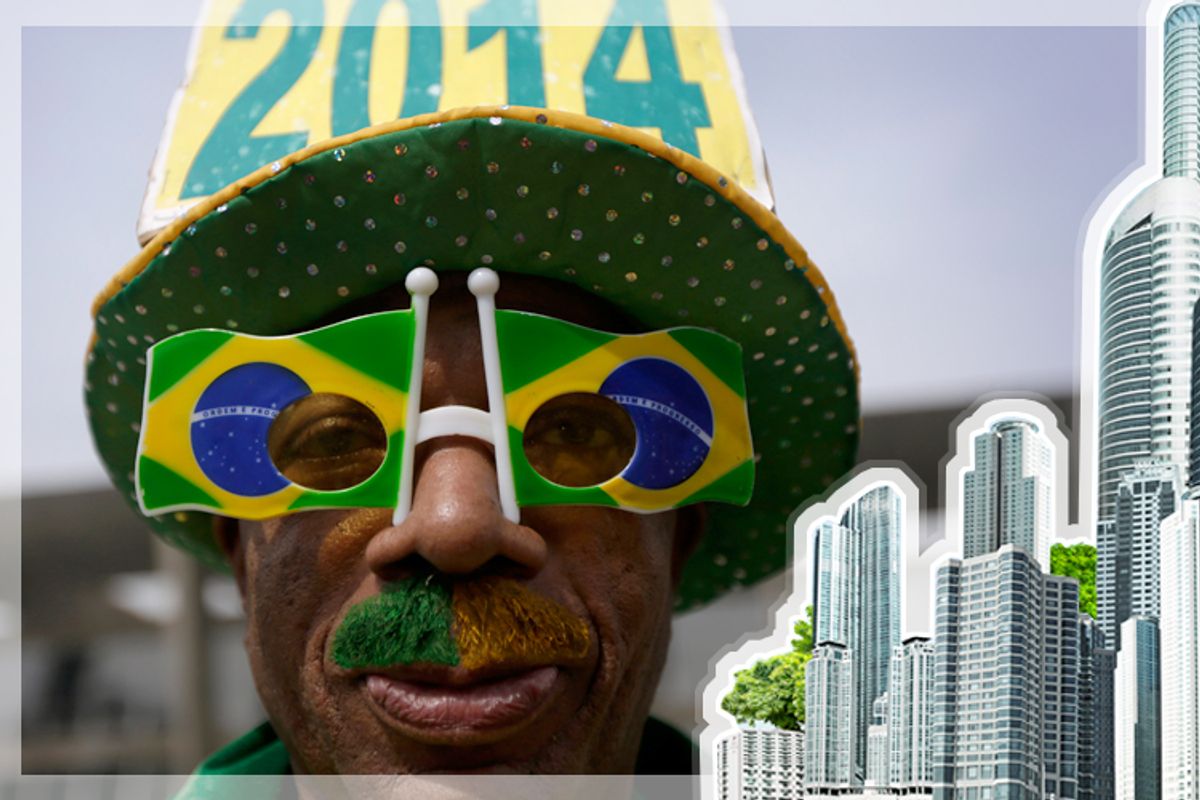There is, as media people like to say, a narrative emerging around Brazil’s upcoming World Cup. And it’s not about soccer, but about unfinished infrastructure, opulent stadiums, match-fixing, evictions and protests. The sordid business of hosting an international sporting event isn’t a back story; it’s the story.
There’s some irony in this, because soccer has for decades been Brazil’s best-known export, the seductive flair of the starting 11 closely linked to the nation's image abroad. At home, too, the squad and the ritual of support have close ties to national identity. But the strong association between Brazil and the Beautiful Game has only heightened the contrast between the organizers’ cheery promotions and the open displeasure of Brazilians.
In taking on the World Cup, has Brazil exposed its own shortcomings -- or those of the competition?
In part, the government has fallen short of its own expectations; a large number of infrastructure projects remain unfinished. A monorail connection to the Sao Paulo domestic airport will not be completed until 2015, and renovations to the terminals are running behind schedule. A light rail system in Cuiabá won’t be open in time; Rio’s Transcarioca bus system, which opened last weekend, still has stations under construction. Half the stadiums, meant to be equipped with luxury perks like free Wi-Fi, will not be fully finished by the time Brazil and Croatia kick off. The list goes on.
But most Brazilians aren't angry about the unfinished projects so much as about the projects themselves. Why is a country with a high incidence of malnutrition spending some $3.5 billion on stadiums? Even the transportation infrastructure projects (especially those that are incomplete) can seem tenuously connected with the lives of ordinary Brazilians. For how many people will an easier connection to the airport constitute an important improvement? Many Brazilians view the general crackdown on the urban informal economy, such as the evictions of favela residents and the demolition of their homes, as an urban renewal project undertaken with the upcoming international exposure in mind.
What seemed a sure bet on a “national passion” has begun to look, to many Brazilians, like trickle-down economics. As Helen Jefferson Lanskyj, author of "Olympic Industry Resistance," writes: “legacy benefits accrue to the already privileged section of the population.” The burdens go the other way.
To some extent, those perceptions are anchored in the remarkable contrasts of Brazilian society. Though income inequality here is declining quickly, and the country will soon have a more even distribution of wealth than the United States, the differing fortunes of the haves and have-nots are achingly visible in every Brazilian city.
But the protests that have roiled the country over the past two years and may continue to do so during the World Cup also mirror an emerging global consensus, from Sochi to Miami to Munich, that the professional sports industry has grossly manipulated the public interest.
In the United States, the announcement of a publicly funded sports event or facility is routinely accompanied by the prognosis that the handout will not pay off. The International Olympic Committee seems to have only two solid remaining candidates for the 2022 Winter Games: China and Kazakhstan. After Sochi's colossal expenses and Beijing's white elephants, who can be surprised that no democracy wants to put the money on the line?
But one-and-done international events – most recently the World Cup, for decades the Olympics, and before that the World's Fairs and Expositions – have historically been important catalysts for cities’ development. It was the 1900 Universal Exposition in Paris that prompted the city to finally construct an underground subway. Japan’s famous Shinkansen bullet train was inaugurated with the 1964 Tokyo Olympics; four Tokyo highways were constructed in preparation. Barcelona, often considered the gold standard for Olympic planning, introduced over 4 million square feet of public space in connection with the ’92 Games. More recently, South Africa built the celebrated Johannesburg-area Gautrain commuter rail for the 2010 World Cup.
Do the benefits of mega-events outweigh the costs? Though dozens of case studies haven’t furnished a conclusive answer, public opinion seems to have shifted. That the citizens in Krakow, Munich and Davos all voted against competing for the Winter Games confirms that the Brazilians are not alone in viewing a mega-event as a disruption and a waste.
The biggest problem today, perhaps, is not with the game but with the players: FIFA and the IOC.
Their pockets have gotten fat indeed. (And not merely with the bribe money that sent World Cup 2022, in an otherwise baffling decision, to Qatar.) The “positive result” that FIFA gets from the World Cup has doubled with each tournament, from $129 million in 2002 to $339 million in 2006 to $705 million in 2010. FIFA’s World Cup dividends this time around could surely pay for a handful of Brazil’s 12 new stadiums. The International Olympic Committee makes more than a billion dollars a year, and more and more each cycle. A former market director for the committee called the games “the world’s longest commercial.”
Sure, IOC and FIFA score lucrative endorsements and television contracts because they put on a good show. But they also require countries to protect their windfall at the people’s expense. At FIFA’s behest, the Brazilian congress passed a constitutionally questionable law that gave FIFA and its sponsors exclusive commercial control over zones surrounding stadiums. It also gives FIFA special trademark protection. Most important, it exempts World Cup sponsors – multinational corporations like Budweiser and McDonald’s – from Brazilian income taxes and industrial and import taxes until the end of 2015.
If FIFA and the IOC want their plans to pass muster with the world’s citizens, and not just its rulers, they ought to change the way they do business. They have no reason to reform because countries have, until now, competed to do their bidding.
In that regard, Brazil’s World Cup-Olympic combo may mark a tipping point. The possibilities of international sporting competitions are great; the practice is looking increasingly flawed.

Shares